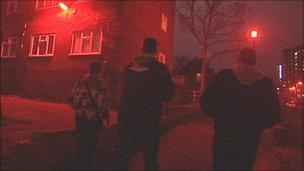Many youngsters in secure units 'far from home'
- Published

Ofsted says youths can be disorientated by being sent far from home
Young offenders and young people at risk in England are often placed in secure accommodation many miles from home, Ofsted inspectors say.
Ofsted said too many youngsters in secure units missed out on family visits as a result.
It said long distances - one young man was over 200 miles from home - meant agencies involved with offenders were often unable to continue their support.
The quality of service was variable among local authorities, it added.
Many were failing to support and resettle youths.
More than 400 children are currently held in England's secure homes and training centres, either because they have committed an offence or because they are there for their own protection.
Inspectors found young people who were on remand or had been sentenced in the courts often did not know where they were being taken.
Parents were often not informed where their children were until they had arrived at the secure establishment.
Inspectors said this made it difficult for secure establishments to plan effective support.
In one example cited in the report, a young man was placed in a secure establishment more than 200 miles away from his parents.
His mother, who was disabled, could travel only by public transport and had to arrange childcare for other children. The youngster only had one visit from his parents in four months.
'Talk funny'
The distance could also make youngsters feel unsettled and more vulnerable.
The report said: "The head of the programmes team at one centre felt that some staff might have become 'desensitised' to the feelings and anxieties of young people and their families when they were placed many miles from home in a strange area with a different local subculture, where the staff 'talk funny'."
Inspectors said support for young people's resettlement into the community was often lacking and planned support from secure units usually stopped when the young person was discharged.
One resettlement worker attended reviews for youngsters who had left and lived within 50 miles of the establishment, but said he was unable to do so for young people who lived further away.
Where young people were not provided with the support, training and accommodation they needed, reintegration into communities often failed, said the report.
Continuous support
It was based on visits to 16 secure children's homes and four secure training centres in England between July 2009 and January 2010, and a survey completed by 232 managers, specialist staff and parents and 175 young people.
John Goldup, director of social care at Ofsted, said: "Young people moving through the secure estate need support which is well co-ordinated, continuous and as close to home as possible if they are to successfully reintegrate into the community.
"While a wide range of factors may lead to offending behaviour, it is clear that young people's chances of avoiding re-offending are damaged if they lose contact with their families, with professionals who are trying to work with them and with the education and training opportunities they will need on discharge.
"Many of these young people are entitled to support from local authorities as young people who have been in care and they are unlikely to get it if the local authority loses contact with them while they are detained."
Chief executive of the Youth Justice Board John Drew said while closeness to home was important, the over-riding priority was meeting the complex needs of some of the most vulnerable and damaged young people.
He said: "To accommodate these unique needs, every youth custody centre in England and Wales, now provides a different range of specialist therapeutic and remedial help, offering children and young people the best opportunities for training and education, resettlement and rehabilitation.
"Ultimately, the YJB believes custody should be a last resort. But for those young people who are in custody we are committed to improving resettlement provision to give them the best chance of reducing re-offending, leading to more productive lives."